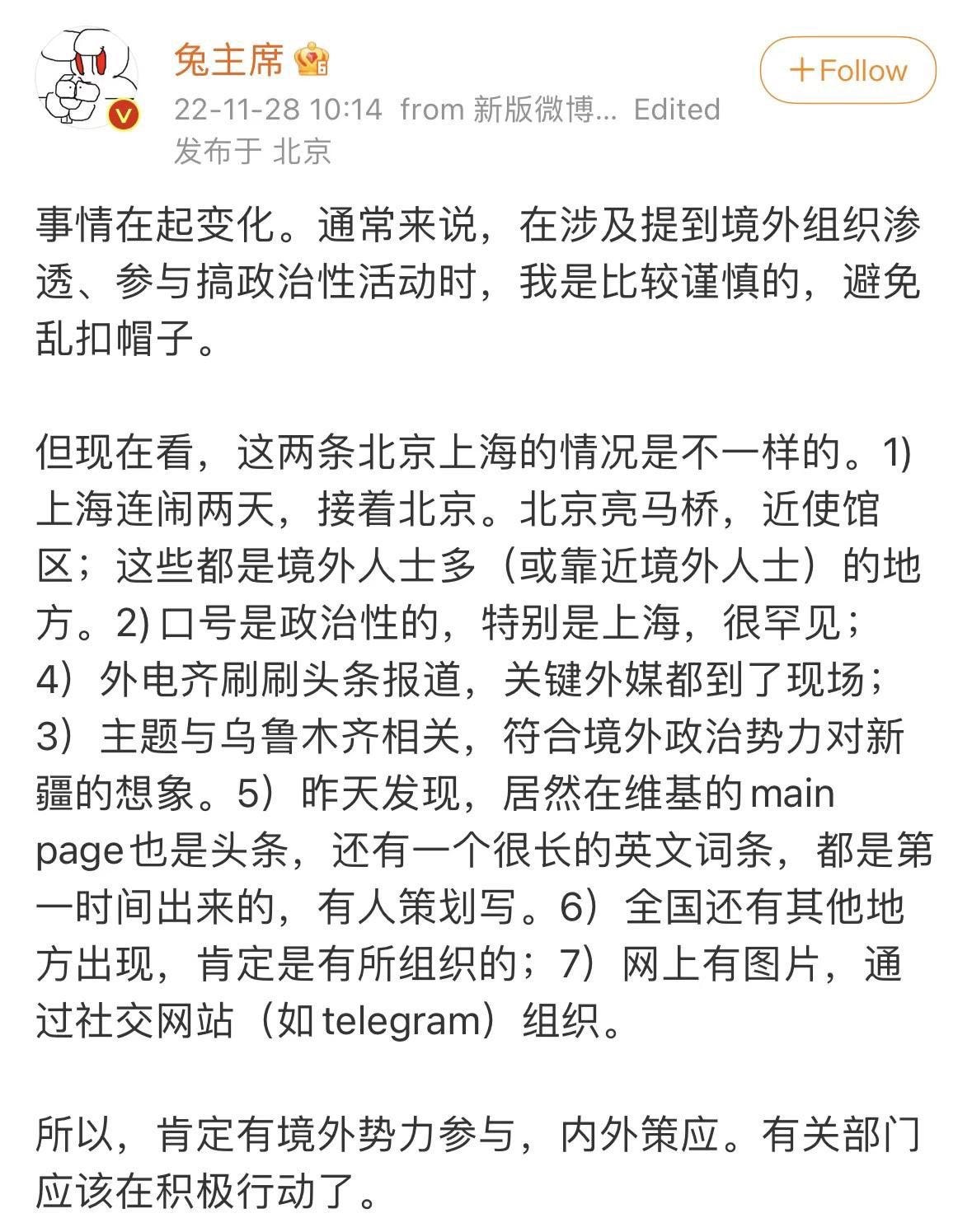Without proof, pro-government influencers blame "foreign forces" for nationwide protests in China
Evidence includes protesters using candles and having Cantonese accent
As protests against draconian Covid zero measures broke out in various major Chinese cities, residents took it to the streets to voice their frustration and dissatisfaction with what they considered oppressive Covid policies and implementations. It's the first nationwide social unrest since 1989. Meanwhile, some pro-government internet influencers and commentators are peddling conspiracy theories to discredit the protesters, claiming with scant evidence that foreign forces were instigating these demonstrations in order to start a color revolution in China.
Many protesters have adopted the method of hold up a piece of blank white paper to symbolize how dissenting voices have been censored by China. The movement has been coined #A4Revolution. But on China's internet, where pictures of street protesters and ordinary netizens holding pieces of white paper have been removed by censors, some pro-government influencers (爱国大V) are promoting the conspiracy theory that foreign forces prefer blank paper over placards with slogans because it would be easier for Western media to photoshop whatever words they want onto the paper.
When it comes to evidence to support the claim, they would point to a screenshot of a tweet. The tweet, as I found out, was from a Twitter account with fewer than 200 followers. The tweet, dated 11/3/22, suggests that people in China could go to politically sensitive locations such as Tiananmen, and take pictures of them holding a blank placard or a piece of white paper, on which slogans can be digitally added later. The tweet received one like.
China has a history of baselessly accusing foreign countries of meddling with China’s internal issues. In 2019, China claimed that a US consulate staffer and an editor at the New York Times were foreign agents helping and commanding pro-democracy protesters. In recent years, pro-government influencers and commentators have also made accusations online regarding foreign forces. In one incident, an influencer account claimed that a large portion of users on Weibo were Taiwanese cyber operators.
Unlike Hong Kong, there are relatively fewer foreign faces in Chinese cities for these influencers to accuse. But when BBC journalist Ed Lawrence was detained by the police “for his own good” while reporting at a protest scene in Shanghai, pro-government influencers were quick to pull out the foreign forces card.
“People in Chengdu, please go home, don’t be instigated by foreign forces,” one influencer, without finding out or disclosing Lawrence’s identity as a journalist, wrote on Weibo with a picture showing Lawrence being apprehended. “Stop saying that there’s no foreign forces. The person they just took away was a foreigner.”
After learning of Lawrence’s identity and the fact that he was in Shanghai instead of Chengdu, he doubled down on the foreign forces accusation by writing in a Weibo post “BBC journalists in China are indeed foreign forces” and should be reported to and deported by the Chinese authorities.
Chinese protesters have soundly rejected the notion that they were supported or sent out onto the streets by foreign instigators. In one interaction between a bystander and a group protesters in Beijing, where the bystander warned the crowd about foreign influence, protesters responded by asking “the foreign forces you talked about, are they Marx and Engels”. Later they added “"we can't even access foreign internet. how can foreign forces communicate with us? There are only domestic forces that forbid us from gathering".


Some protesters even created a slogan to counter the accusation: “I’m no foreign force. I’m a citizen of China!”
On Weibo, a real-times search of keyword “foreign forces” shows that many netizens mock the idea that foreign forces were behind the protests.
Lacking concrete evidence, some influencers opted for even less convincing but harder-to-disprove theories.
A popular conspiracy theory involving foreign forces has been that people leading the protest in Chengdu, a city in Southwestern China, had Cantonese accents, which, as some pro-government influencers claimed without evidence, indicates that they were C.I.A. hired operatives from Hong Kong.




Some influencers also argued that protesters using candles to commemorate the ten residents killed in an apartment fire in the locked down city of Urumqi, the tragedy that had sparked the nationwide protests, were suspicious because only Westerners would use candles. Chinese people traditionally bring wreaths to funerals.
There has also been rumors that some protesters were paying 200 to 500 RMB for each person to protest. But no further evidence was provided. Some pro-government influencers and netizens also use Christians showing up at some protests as evidence that foreign forces were involved.
Chairman Rabbit, a popular nationalist commentator in China, wrote down in a Weibo post a list of signs he saw that suggests foreign forces were secretly pulling the strings, including the fact that many foreign media outlets have reported on the social unrest and placed stories at prominent spots on their websites. He was then mocked and scoffed at by netizens in the comment section. The Weibo post can no longer be found.
Hu Xijin, former editor-in-cheif of the Global Times, now a commentator for the publication, didn’t outright claim that foreign forces have manipulated the protests. But in a Weibo post, he warned that if the protests continue, they will be “easily used or even hijacked by other forces” and “eventually turn into a flood that will destroy our life altogether”.
The Chinese government and state media haven’t made any accusations yet. But on Monday, Zhao Lijian, China’s spokesperson, claimed at a press conference that “outside forces with ulterior motives” were responsible for linking the deadly fire in Urumqi to China’s covid control measures.
He did not mention the nationwide protests at all.







